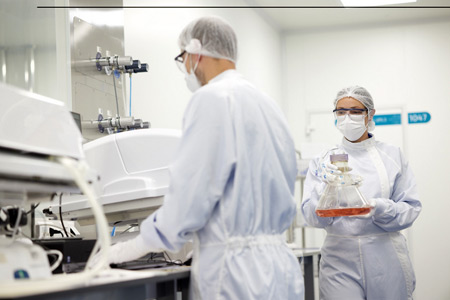Viralgen and two labs based in the Broad Institute of MIT and Harvard University have partnered to develop and manufacture an innovative approach to gene therapy for prion disease. This partnership aims to deliver life-changing treatment to patients at risk or suffering from this rapidly progressive neurodegenerative disorder.
Prion disease is responsible for a group of terminal neurodegenerative disorders caused by protein misfolding. It is a fatal condition which can be inherited or arise spontaneously, affecting patients and their families in profound ways. With no current prevention, treatment, or cure available, those affected face a difficult and uncertain future. Through this partnership, Viralgen, the Vallabh/Minikel Lab, and the Deverman Lab are taking steps toward potentially changing the future of these patients by developing an adeno-associated virus (AAV) gene therapy designed to address prion disease.
This joint effort is rooted in a shared vision of expanding the boundaries of gene therapy to combat genetic diseases. As part of this collaboration, Viralgen will bring in its expertise in AAV manufacturing, including the advanced production process using the Pro10™ platform cell line. This alliance will involve testing processes to produce novel viral capsids—critical vehicles that encapsulate the therapeutic genes—to ensure optimal delivery to the brain. Together, the teams will determine which capsids and other elements of the transgene expression cassette yield the best combination for optimal manufacturability and potency, with the ultimate goal of delaying or preventing serving prion disease.
Sonia Vallabh, co-leader of the prion disease initiative at the Broad Institute, brings a personal perspective to this labor. Sonia began her mission after living through the rapid, mysterious decline and death of her 52-year-old mother from an undiagnosed dementia in 2010. A year later, she learned that her mother had suffered from a genetic prion disease and that she had inherited the same mutation, placing her at risk of developing this condition. Leaving behind a career in law and consulting, Sonia, retrained as a scientist, and along with her husband Eric Minikel, they started to work toward treating and preventing this disease. This investigational gene therapy is a major milestone in their journey to finding a cure.
"We're incredibly lucky to be doing this work at this exact moment in time," Sonia reflects. "Because prion disease is a whole brain disease, we've faced two major challenges from the beginning: finding a molecular machine that can target our gene and delivering that machine to enough neurons in the adult human brain to make a difference. It is just now becoming imaginable that, with the right team, we could piece together answers to these two big questions in our lifetime. We're so fortunate to have the chance to try."
"We are honored to collaborate with the Broad Institute on this investigational initiative," commented Jimmy Vanhove, CEO of Viralgen. "By combining our expertise in gene therapy manufacturing with the Broad Institute's scientific proficiency, we aim to progress significantly in the development of advance treatments for prion disease patients."
This partnership underscores the commitment of all parties to delivering innovative solutions that may change the lives of patients affected by genetic diseases. Together, these organizations aim to bring hope to a patient community with an urgent unmet need.
About Prion Disease:
Prion disease is a rapid neurodegenerative disease that is currently untreatable and always fatal. While prion disease can be genetic, the majority of cases occur randomly, with no known genetic or environmental trigger. Regardless, in all cases the disease is caused by a single protein – the prion protein (PrP) – encoded by the prion protein gene, PRNP. While benign in its native state, PrP has the unique and dangerous ability to undergo a post-translational change in conformation, transforming into a so-called "prion." Misfolded prions spread across the brain by recruiting and templating the misfolding of additional PrP molecules. This process kills neurons, leading rapidly to dementia and death. Unlike other neurodegenerative diseases that may unfold over years or decades, prion disease kills the average patient in less than six months of their first symptom.
For more information, visit www.viralgen.com.


